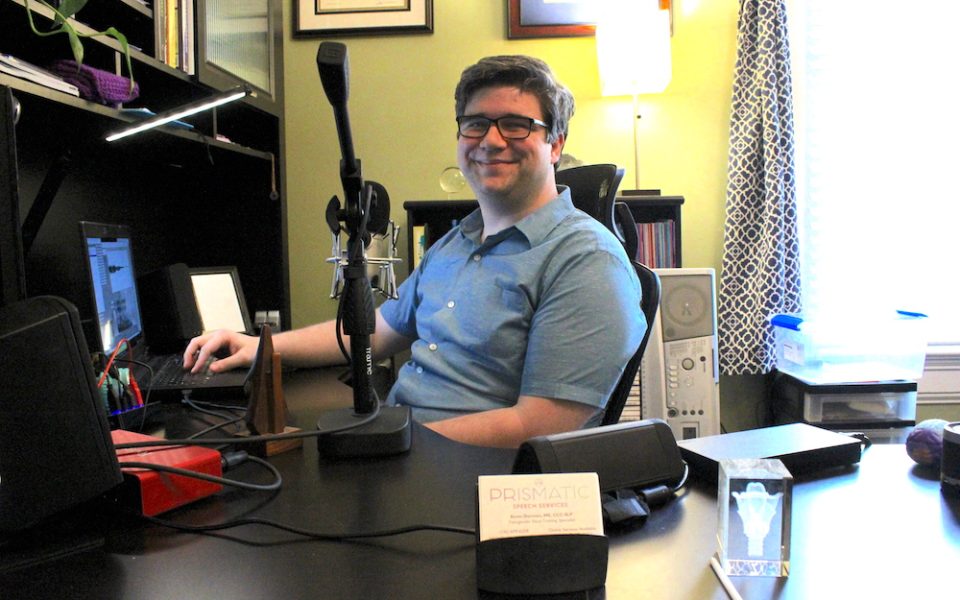As a child, Kevin Dorman would impersonate cartoon characters like Courage the Cowardly Dog and Dexter from “Dexter’s Laboratory.” They would have competitions with their older brother to see if they could outdo one another.
“I wanted to be a voice actor,” says Dorman, who is a speech therapist. “Growing up with that mentality helped me approach this work with a sense of play and source of experimentation.”
Now, at 27, Dorman runs Prismatic Speech Services in Greensboro, a company that helps transgender individuals work on their voices to better match their gender identities. Dorman, who identifies as transgender and non-binary, uses they/them pronouns and began looking into speech therapy after their high school theater teacher suggested the career path.
“I was looking for a different way to channel my voice,” they say. “I did a lot of theater and singing and extracurricular arts activities.”
When Dorman enrolled at UNCG in 2009, they initially began as a theater major but soon transitioned to speech language pathology after taking a fundamentals course.
“I was hooked,” they say. “I don’t typically think of myself as a science person but the application to sound was truly fascinating; I wanted to pursue that feeling.”
Dorman began their coming out process when they were 20 years old.
They remember having an “aha” moment when they were working as a second-grade teacher assistant when one of the students called them Ms. Kevin.
“She was really embarrassed but I said, ‘Oh, you can call me Ms. Kevin,’” they recall. “And I realized that I didn’t mind being called that.”
Dorman says that their relationship with their voice has evolved over the years.
“I’ve learned to appreciate my voice in both its masculine and feminine and androgynous traits,” they say. “I have masculine and feminine traits to my speech like talking with my hands or pitch differences in my voice. That makes me feel happy with my own presentation because it’s not specifically pegged to either. My voice has ultimately been a place of empowerment for me and I want to share that empowering feeling to as many people as I can.”
Dorman opened Prismatic Speech Services in November 2016 and works with clients in North Carolina, South Carolina, Virginia and Georgia, mainly through telepractice sessions.
They say that some of the transgender patients they work with hate their voices. They’ve even been told by clients that if they could stop speaking and just use sign language they would.
Dorman says that having a voice that matches the person’s gender identity is important.
“I feel like transgender people are held to a higher degree of scrutiny when it comes to gender,” they say. “For example, a transgender woman, her femininity is regarded with more scrutiny than a cisperson. People just want to feel safe. They don’t wanna deal with harassment.”
Kate Padgett, who identifies as female, enlisted in Dorman’s services after lacking the confidence to speak in public and being discouraged with the progress she was making on her own.
“I didn’t feel like my voice passed,” she says. “I wanted to present my voice and my face in a certain way and when they [didn’t] match, they caused discomfort.”
To start, Dorman takes measurements of patients’ voices by having them recite a standard paragraph and then recording casual conversations. This helps them determine the lowest and highest pitch that the person produces. Then, they talk with the client about what they want to accomplish whether it’s sounding more masculine or feminine or fixing a speech problem.
They often use impersonations and playing around with different characters to try out various resonances — sounding like a Southern belle for a female-sounding voice or the differences between an elephant versus a mouse, a cello versus a violin.
“It’s really fun and not as technical,” Dorman says. “People’s voices are a lot more flexible than they think they are. They just need to give themselves permission to play.”
Dorman also takes into account clients’ vocal hygiene, like whether they smoke or how much water they drink throughout the day. They ask clients about their support networks and whether they have safe spaces where they can practice or do homework once they leave the office.
Now, after about 11 sessions, Padgett speaks at an average of 240 Hz, the middle range of a typical adult female voice, which measures from about 165 to 255 Hz.
“Voice is a very important part of gender presentation,” Padgett says. “I’m definitely more confident just as myself in general and speaking in public. It’s been a key part of my transition for me. A big factor of my happiness has been being able to do what I want with my voice.”
Some transgender people opt for surgery to change their voice, but Dorman says they should try speech therapy first to avoid risk of complications and the steep expenses. With speech therapy, Dorman says clients can see improvement within 10 to 12 sessions.
“Many trans people feel silenced by their voice,” Dorman says. “Our voices are how we advocate for ourselves and it’s how we speak for ourselves. If they can’t speak, they can’t make their needs known.”
Find out more about Prismatic Speech Services at their website.
Join the First Amendment Society, a membership that goes directly to funding TCB‘s newsroom.
We believe that reporting can save the world.
The TCB First Amendment Society recognizes the vital role of a free, unfettered press with a bundling of local experiences designed to build community, and unique engagements with our newsroom that will help you understand, and shape, local journalism’s critical role in uplifting the people in our cities.
All revenue goes directly into the newsroom as reporters’ salaries and freelance commissions.


Leave a Reply